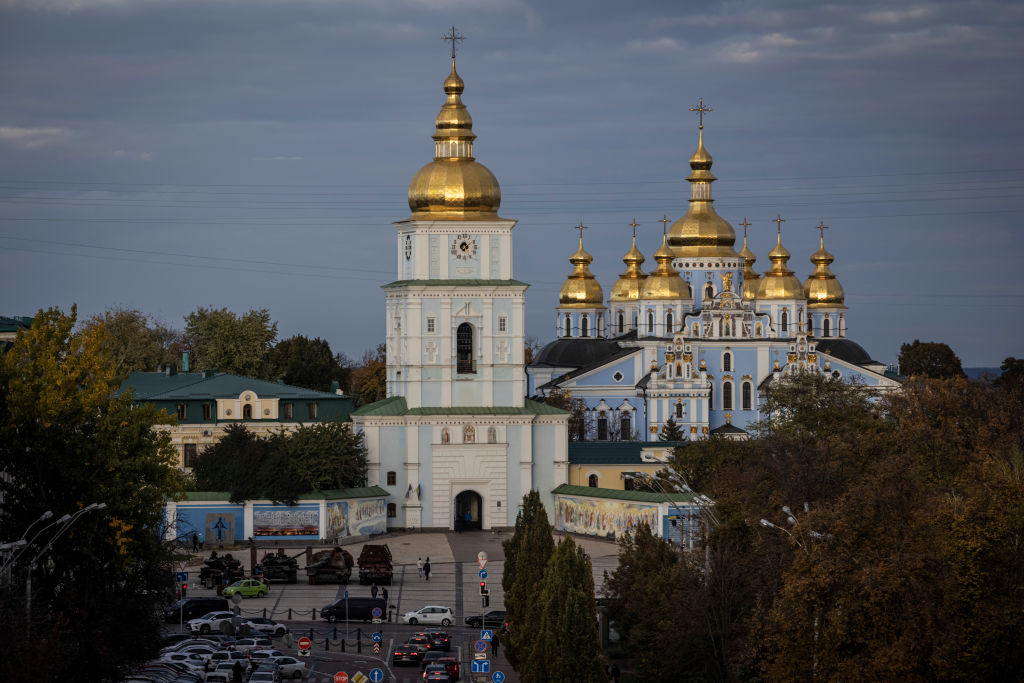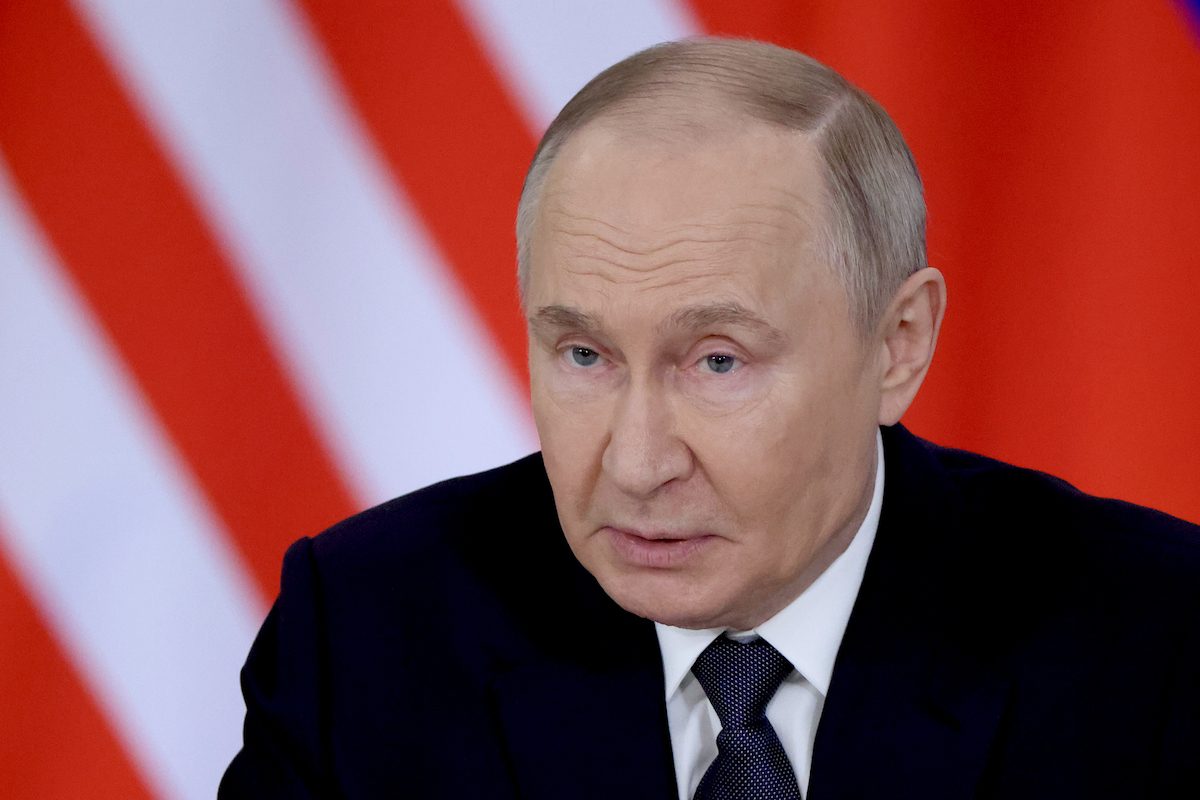It was 11:15 p.m. in Kyiv, just after the curfew, and the military had set up its checkpoints on the city streets. Finding your way home after hours can be a hazardous business. The city is paranoid about assassins and saboteurs, and in wartime few are above suspicion. Things were looking ominous until my friend Sasha declared: “we are late for breakfast.” The guards waved us through. This was the daily password, shared with those important enough to move around after curfew.
Checkpoints and curfews were a few reminders of the war in Kyiv, where I was just before last week’s deadly air strikes. In the capital city, life was approaching some form of normalcy. I arrived in Ukraine with a pretext to do reporting, but in reality I just wanted to be with my friends during their great trial.
In the streets of Kyiv, a sense of calm mixed with qualm and caution that the Russian army may attempt to take the city again. Just a few months ago, a place full of life, with eclectic architecture that blends shiny church-tops, art-nouveau buildings, Soviet monstrosities and modern glass high-rises, turned into a ghost town. But after Russian forces were beaten back from the capital, people returned to the city. With its mystical foggy mornings and charming Dnipro river, Kyiv continues to stand firm as a symbol of Ukrainian resistance.
Journalists and volunteers, fighters and chancers, people from all walks of life are drawn to a city in the spotlight of history. Visiting grandees make stops in Irpin and Bucha to see with their own eyes the horrors of Russian occupation. Foreign fighters mix with Ukrainian soldiers at the train station. Ukrainian flags fly on the balconies, murals of the war cover apartment buildings, barricades and sandbags block entrances to government buildings. On the streets, you hear English, French, Polish and of course Georgian, my native language.
There is, I imagine, something of the feel of Barcelona during the Spanish Civil War. “It is the same in all wars,” George Orwell wrote in Homage to Catalonia. “The soldiers do the fighting, the journalists do the shouting, and no true patriot ever gets near a front-line trench, except on the briefest of propaganda-tours.” Those lines ring true today. Things are clearer cut in Ukraine, but as with Spain in 1936, Ukraine has become a magnet for believers in search of a cause.
***
Eight years ago, after Russia waged a war for Ukraine’s eastern regions and annexed Crimea, I went to live in Kyiv. The Revolution of Dignity had just swept the country and the war was still fresh. The capital city was full of the euphoria of revolution, the desire for change and enthusiasm for the future.
I traveled across the country, from the Russian-speaking parts in the east to strongholds of Ukrainian nationalists in the west. In frontline towns, I saw ruined apartment buildings, bombed schools and toppled Lenin statues. In the West, war felt distant, but it was still visible. Train stations were full of soldiers going to the front, carrying rifles, bags of food and clothes. The war then was different in its nature and scale from what came this year.
“If anything was to happen, I assumed Kyiv would be the safest place, so I bought a house in Bucha,” said Alexey, who I met smoking a cigarette between the cars of a train, en route from Warsaw to Kyiv. He was laughing at his own misfortune. The house was now half-ruined.
Kyiv has borne witness to the bloody and tragic history of the twentieth century. Imperial armies and Ukrainian nationalist groups fought each other in its streets. It was leveled by the Nazis. Now, in the twenty-first century, the Russian army was defeated in its suburbs, leaving destruction, death, torture, rape, and ruined lives. Those who lived through those atrocities want to tell their story. Talking is a way of trying to make sense of what happened.
The train ride is long. The wait at the border kills the adrenaline. The platform is full of Ukrainians returning home, kids running around and women carrying suitcases (military-age men can’t leave the country). Two hours on the Polish side, then two hours on the Ukrainian one, if you are lucky. Those waiting curse the invaders who have made their lives hell, all for their bankrupted imperial ambitions. Leaving Poland, and the safety of NATO, you are crossing into a country fighting for survival — and paying for the perceived Western failure to wake up to the scale of the Russian threat.
Sixteen hours later, you are in Kyiv.
“The soft positioning on behalf of the West vis-a-vis Russia is one of the reasons that provoked Putin to such scale of the aggression,” Mikhailo Podolyak, advisor to Volodymyr Zelensky, told me when I went to see him at the Office of the President.
To get to Bankova — government headquarters — you pass through several checkpoints. The windows are blocked by sandbags and the corridors of power are as dark as night. Officials have a change of clothes in their cabinets in case they need to go down to a bunker or spend a night in the office. Podolyak elaborated: “The West was not ready to allow Ukraine in the EU and NATO, reluctant to supply arms back in 2014 to fight Russia in the East and unwilling to boldly respond to Russia’s expansionist moves.”
Back in 1936, everyone saw the Spanish War as a grand rehearsal for the coming danger. This time, Ukrainians rue the West’s past missteps.
***
“Isn’t Kyiv the only place in the world right now?” a Ukrainian friend said to me. No matter how vain or indulgent it sounds, those who have flocked here, myself included, feel alive, brave and part of a cause that’s greater than oneself. Worries about failed relationships, unfulfilled dreams and unaffordable avocados wither away in the reflected heat of battle. People have always been driven to adventure, for one or another reason, but in Ukraine, as in the Spanish Civil War, many who come feel a need to act in the face of injustice and cruelty.
For everyone else here, life carries on. Kyiv residents hurry to work at 9 a.m., coffee shops are open, restaurants are in full swing. Air raid sirens go off but are generally greeted with a shrug. The recent massive bombings and threats of nuclear attack from Russian President Vladimir Putin are unlikely to change that. As if to prove this point, Ukrainians repaired the crater created by a Russian rocket on Kyiv’s central Volodimirska Street overnight.
Tourist stalls sell war memorabilia: Ghost of Kyiv T-shirts, “Russian Warship Go Fuck Yourself” key rings. In taxis, war songs play on Radio Bairakhtar, named in honor of the Turkish drone which played a starring role in the war’s early months. In the meantime, international retailers like Zara and Massimo Dutti are still closed, with mannequins like the ghosts of February still touting last winter’s trends.
***
“To our victory and yours” toasts a friend of mine, who volunteered to join the Ukrainian military, raising a glass of wine. We were at a bar in Kyiv’s central Golden Gates district, where many of Kyiv’s brightest characters tend to gather. Soldiers mixing with dog-walking hipsters, photographers and diplomats drinking Negronis in cafés. You might bump into world-renowned chef Jose Andres searching for company, meet a well-known Hollywood producer in search of an Emmy, or be invited to a farewell party for Boris Johnson, a folk hero in these parts of the world.
One evening, I ran into an American volunteer at a bar in Kyiv, who is fighting with the International Legion. Another evening, I talked to an American who wanted to join one of the paramedic units and was learning Ukrainian. At the train station in Lviv, I met a nurse from Bristol, UK, who has spent four months volunteering in the Dnipro, a city under regular Russian fire. She was now going back, and you could sense how conflicted she felt: about the world she was leaving behind and the one she was going to return to.
Why, I asked them all. I know why a Ukrainian or a Georgian would fight in this war. But why leave the comfort of Bristol or Boston to risk your life here? It was the right thing to do, they all told me in one way or another. It’s easy to be cynical and dismiss these people as mere adventurers and war tourists, but there’s something honorable happening here too.
The war in Ukraine has given concepts of humanity, democracy, and freedom genuine meaning at a time when in the West many have become sarcastic about them. We find it hard to still believe in the idea of inner honor, the sort that makes you die for your friend.
Orwell explained his decision to join the anti-fascist cause with a characteristically simple phrase: “common decency.” This is what I encountered again and again in Kyiv. Common decency. A desire to stand alongside these people as they face down the threat of oblivion. Amid all the misery that Putin has unleashed on Ukraine, that is an encouraging thought.

























